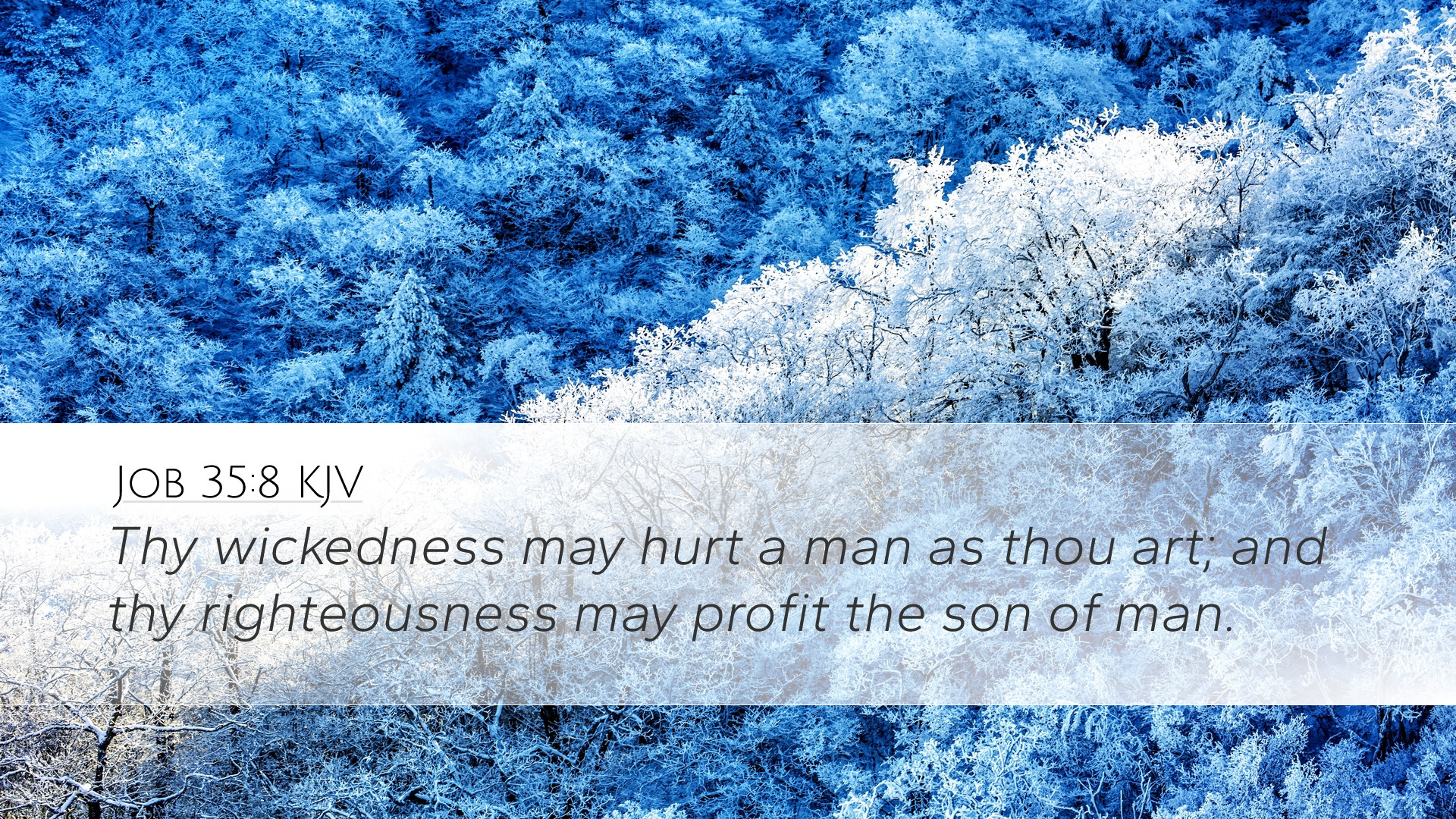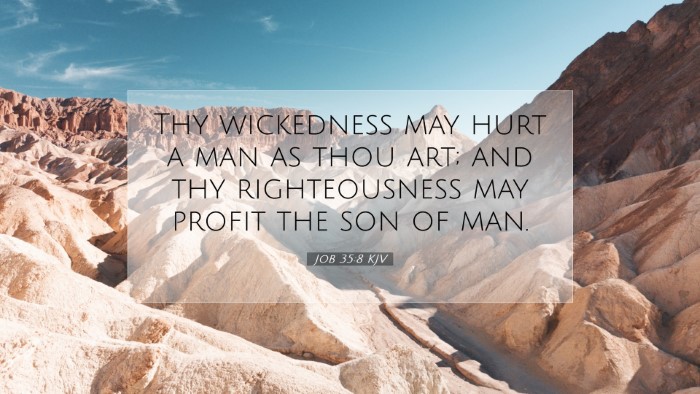Old Testament
Genesis Exodus Leviticus Numbers Deuteronomy Joshua Judges Ruth 1 Samuel 2 Samuel 1 Kings 2 Kings 1 Chronicles 2 Chronicles Ezra Nehemiah Esther Job Psalms Proverbs Ecclesiastes Song of Solomon Isaiah Jeremiah Lamentations Ezekiel Daniel Hosea Joel Amos Obadiah Jonah Micah Nahum Habakkuk Zephaniah Haggai Zechariah MalachiJob 35:8
Job 35:8 KJV
Thy wickedness may hurt a man as thou art; and thy righteousness may profit the son of man.
Job 35:8 Bible Commentary
Commentary on Job 35:8
Bible Verse: "Your wickedness affects only a human being like yourself, and your righteousness only the fellow man." (Job 35:8)
Introduction
The verse Job 35:8 presents a profound insight into the relationship between human actions and their effects. In the context of Job's discourse with Elihu, this verse reflects the understanding of divine justice, the nature of righteousness, and the implications of human behavior. This commentary will explore interpretations from public domain sources to enhance understanding for pastors, students, theologians, and Bible scholars.
Contextual Analysis
Job 35 falls within Elihu's address to Job, where he seeks to clarify Job's understanding of God's nature and justice. Elihu argues that human suffering does not necessarily correlate with personal sin, challenging the traditional view held by Job's friends. Instead, Elihu posits that God's greatness and incomprehensibility transcend human righteousness or wickedness.
Interpretations from Commentators
-
Matthew Henry:
Henry emphasizes that Elihu's argument directs attention away from self-righteousness towards a greater understanding of God’s holiness and justice. He notes that human actions, whether righteous or wicked, primarily affect one’s relationship with fellow humans rather than altering God's disposition. Henry comments on the philosophical implications of this verse, suggesting that the ultimate accountability lies with God, while human righteousness serves to benefit the community.
-
Albert Barnes:
Barnes discusses the implication of personal responsibility in this verse, noting that Job's afflictions and the actions that led to them are predominantly relational. He argues that the moral quality of Job's actions relates more to social dynamics than to divine judgment. Barnes points out, however, that while human conduct may not change God’s nature, it does affect how humans relate to each other, thus highlighting the communal aspect of morality.
-
Adam Clarke:
Clarke analyzes the theological ramifications of this verse, asserting that it speaks to the nature of God as sovereign and unapologetically just. He emphasizes that the wickedness mentioned does not influence God’s character but incurs human consequences. Clarke extends this idea by stating that righteousness can lead to collective benefits, shaping a society that reflects God’s holy standards. His commentary calls for a recognition of the moral fabric in interpersonal relationships.
The Nature of Wickedness and Righteousness
This verse invites a deeper exploration of the implications of human actions. While wickedness might seem to hold inherent value in the earthly context, Elihu's assertion represents a profound spiritual truth—the temporal does not dictate the eternal. Throughout biblical narratives, the effects of moral actions emerge clearly: wickedness begets social fragmentation, while righteousness fosters community and well-being.
Wickedness and its Isolation
Drawing from the commentaries, we understand that wickedness is isolating—its effects are often reflective and confined within human relationships. Henry notes that the consequences of wickedness do not breach the divine will but operate within a web of social consequences. This conception encourages believers to recognize the detrimental effects of sin not only on individual lives but on collective human experiences.
The Role of Righteousness
In contrast, righteousness symbolizes communal health and divine alignment. Barnes sheds light on how righteous actions contribute to communal harmony—acts of goodness nurture relationships and strengthen societal bonds. Clarke highlights that righteousness serves not merely as a personal endeavor but as an overarching moral guideline essential for societal flourishing.
The Pursuit of Justice and Understanding God's Ways
Elihu's discourse urges Job—and by extension, readers—to cultivate a broader perspective on suffering and divine justice. Understanding the complexities of God's governance requires humility and a willingness to explore truths that may defy conventional wisdom.
Theological Implications
The theological implications of Job 35:8 extend into the realm of divine sovereignty and human agency. It invites a discussion on the relationship between God’s immutability and human influence. The commentaries concur that while human actions carry weight, their ultimate significance lies within the larger narrative of God's redemptive plan. Henry and Clarke emphasize a God who remains constant, unyielding to human action yet intricately aware of human plight.
Application for Faith Communities
This verse serves as a critical reminder for faith communities about the nature of our actions and their ripple effects on each other. In a culture that often encourages self-centered pursuits, Job 35:8 calls believers to a higher standard of accountability and awareness of the communal impacts of their conduct.
Encouraging Moral Responsibility
Pastors and leaders can leverage this verse in sermons and teachings to foster discussions surrounding personal morality and collective accountability. By intertwining Elihu's insights with contemporary societal issues, they can encourage congregants to engage in reflective practices and community-building efforts.
Conclusion
In conclusion, Job 35:8 captures the nuanced relationship between human behavior and divine authority. The insights from Matthew Henry, Albert Barnes, and Adam Clarke collectively highlight the significance of understanding human righteousness and wickedness in light of God’s unchanging nature. For theologians and scholars, this verse offers a poignant reminder of the depth of biblical wisdom regarding moral actions and their implications for communal life.


